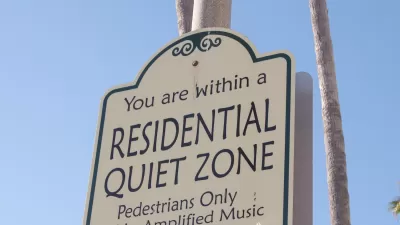Researchers are beginning to understand the effect of sounds, smells, and tastes in the urban experience.

An article by Jennifer Hattam in Technology Review makes an argument for looking beyond the visual bias in urban planning, calling for a more comprehensive ‘sensory urbanism’ that acknowledges the role of sounds, smells, and tastes in urban life.
Hattam introduces the reader to David Howes, a researcher “investigating how nonvisual information defines the character of a city and affects its livability.” Howes uses a variety of methods to understand how the non-visual aspects of a city impact the experience people have. “His research has identified locations where vegetation could be planted to dampen traffic noise or where a wave organ could be constructed to amplify the soothing sounds of the sea, something he was surprised to realize people could hardly hear, even along the waterfront.”
According to the article, “this kind of individual feedback about the sensory environment is already being put to use in Berlin, where quiet areas identified by citizens using a free mobile app have been included in the city’s latest noise action plan. Under EU law, the city is now obligated to protect these spaces against an increase in noise.”
While experts warn that researchers collecting sensory data must be mindful of privacy concerns, putting a focus on the many layers of sensory experience in a city can help planners understand the full spectrum of urban experience.
FULL STORY: Why sounds and smells are as vital to cities as the sights

Maui's Vacation Rental Debate Turns Ugly
Verbal attacks, misinformation campaigns and fistfights plague a high-stakes debate to convert thousands of vacation rentals into long-term housing.

Planetizen Federal Action Tracker
A weekly monitor of how Trump’s orders and actions are impacting planners and planning in America.

San Francisco Suspends Traffic Calming Amidst Record Deaths
Citing “a challenging fiscal landscape,” the city will cease the program on the heels of 42 traffic deaths, including 24 pedestrians.

Adaptive Reuse Will Create Housing in a Suburban Texas Strip Mall
A developer is reimagining a strip mall property as a mixed-use complex with housing and retail.

Study: Anti-Homelessness Laws Don’t Work
Research shows that punitive measures that criminalized unhoused people don’t help reduce homelessness.

In U.S., Urban Gondolas Face Uphill Battle
Cities in Latin America and Europe have embraced aerial transitways — AKA gondolas — as sustainable, convenient urban transport, especially in tricky geographies. American cities have yet to catch up.
Urban Design for Planners 1: Software Tools
This six-course series explores essential urban design concepts using open source software and equips planners with the tools they need to participate fully in the urban design process.
Planning for Universal Design
Learn the tools for implementing Universal Design in planning regulations.
Heyer Gruel & Associates PA
JM Goldson LLC
Custer County Colorado
City of Camden Redevelopment Agency
City of Astoria
Transportation Research & Education Center (TREC) at Portland State University
Jefferson Parish Government
Camden Redevelopment Agency
City of Claremont





























